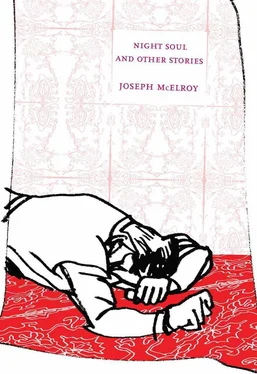For he could work anywhere. Dictated while bike-riding, that best of all angles sitting the saddle of his wise hybrid. Here’s to the North River bike path, here’s to genes, women, good manners, work, massage. Here’s to cortisone (which gave you a headache); ibuprofen, death on the kidneys you heard (so one morning he stopped taking it). Stamina notorious. Anything was better than standing on his feet, walking a few blocks and stopping. Or flying. (He kept it to himself.) Worst was getting his legs out of bed to the stab in the back like a sickening alarm or the phone that actually had woken him ringing inside his head with some message — for he wasn’t in pain, the pain was in him, he would say. It didn’t quit thinking, he said. Kayaking on hold, the run at dawn too, which had absorbed him, for the River could make him forget. His lower back always behind him not that it knew to haunt him. There was a pretty good upright piano at Caesar’s. He sat at it more easily than his own. Which was not an upright but a baby grand. Never knew what he would play, until his fingers touched down, he’d had a wild man for a teacher, an uncle, a non-teacher really.
The new acupuncturist he kept to himself. But here’s to her as well. Sometimes the cool ones come closest. She hadn’t recognized his name when he’d phoned her one long afternoon. Yet then she did, he sensed. He spelled it for her, X-i-d-e-s ( why did he?), Xides (as in my ), and said it again, Zai-deez . Who had referred him? Well, a journalist friend who didn’t know her but…had been given her name by…someone he’d sat next to at a briefing (?). Another writer? No idea.
She was thinking, and you could hear the faintest pause. She was on the move. Doing things, he felt. He heard the little clack of the blinds being raised. They both knew there was more. But she would see him.
In fact his friend the correspondent had said leave him out of it, he’d run into this guy at a structural materials show, metal glomming onto bone came up in the conversation and orthopedists, and in this way a certain friend, no name dropped, of the correspondent’s with back trouble came up whom he’d expected to see here but remembered was out of town. Whereupon the guy recommended an acupuncturist. Extremely good, uncanny, though a gal bent on remaking you from the ground down, and a great little terrorist.
It was an interruption, Tuesday Friday appointments, though he doubled up an errand that needed doing in her neighborhood.
She dressed in black and stood very straight, a person, pale, compact, and, when he thought about it, smooth or learned in her body. What’re you gonna do? Maybe she knew something and could help. Swami healers could diagnose over the phone sight unseen. What was the truth? He left it to her. Her hair, so darkly un-reflecting, was caught up behind in a clasp at her neck yet in front combed tight back into her scalp like a Hispanic girl’s on the subway first thing in the morning. She saw the two dark tucks where stabs had found his rib cage years ago. She had him prone at first, hard for him so mostly she put him on his back which he eased down flat on the table.
Belly, ankle, nostril, groin, you let her go where she would, she’s licensed. It was the needles, wasn’t it? Longer than he had thought, flexible, thread-thin, sensitive to where they went. Earlobe or right inside the ear the cartilage (the heel of her palm brushing his beard), placing her needles. Fine steel planted like markers, not at all an inoculation, she might string two or three together, he told Eva.
Needles placed to free the flow along the channels. Methodical, yet more. He resented coming, didn’t he? He would surprise her. She told him what she was doing. What did she know? It multiplied. She came and held a small mirror to his face. “Look at our color.”
The flush prickled his forehead and cheeks, you’d think he’d taken too much of something, niacin high potency or a couple of real drinks on top of his pills. “See the difference?” The phone went once in the other room almost answering her — was it the third time he’d seen her? — and seemed to tell her she would pick up. He made a sound back in his throat, “Mmhmm,” lying there wondering if the darkening pink in his face was good for the lower back or would last when he left. The mirror lingered.
Peering into the glass held above his face like a photo in a cell-phone camera — like swollen material — Look what we’ve accomplished, he heard her say. More than pink; stupid-looking, he thought. Cooked, and the timer went off. The phone had answered her question before she asked it. It was the needles, where she stuck them in. Her intricate treatment took effect crudely.
She saw her patients where she lived. He would stretch out on the table in the treatment room. There was a long couch, too — an open-out daybed, he figured, from the clear front line of the frame just visible beneath the three seat cushions. At either end of it stood glass-front bookcases displaying selected volumes, leather-bound Materia Medica, racks of stoppered phials, small blue-and-white plastic dispensers containing white remedy pellets. He was actually tired of his back acting up. He wanted her to do something for him, and he told her this.
It was when she first had sat him down to tell her what had been going on. You came in through the front door and just beyond the foyer a desk came into view against the near wall, a small, neat, dark-lacquered table, no more than that; a chair for her, a chair for you. They reviewed what he was taking. Illnesses? Never. Work? He let it be vague — urban space, an idea person — (he did not say architect or planner ). He traveled some (didn’t tell her that he was in demand). Exercise? Violent. Eating, alcohol, sex? Sure. Allergies, none. She was at home here with him. She was a thinker. She had a look at his tongue. He smiled, his cheekbone itched. He would write an account of himself, please, for next time, a page would do. He didn’t know what she knew. He had noticed a traveling clock somewhere. She didn’t wear a watch. He wanted to know nothing about her, he was fifty-two. He couldn’t help what he knew. His appointment times inscribed in her little book so little it made, like her minute handwriting, a statement that what mattered was elsewhere. And, among other things, it was him. Or some feminine economy. The chairs were of black maple, he thought, but spare and light to lift, a clarity to sit in, a sweet, unpainted smell or their making itself gave less weight, you could certainly stand on them. She led him away into the other room.
Her quick way of talking made you forget the silences. Or remember them, because when you started to say something, it reminded her, and she was off, almost. Yet quiet. A dominant person. You must listen. He could time her pauses. She belonged to him not quite for an hour. Prick the outside, change the in-. Leaving, he had a sensation of warmth circulating laterally across his back and belly.
A current they knew was there, she had said, but didn’t wholly grasp. How come? he said. She looked at him.
Young, she called him Mr. X the third time he saw her. Mr. X? It didn’t seem like her. A nickname was new for him yet was this one? It went unmentioned to his friends. Like her address, which surprised him yet with one of those familiar New York coincidences no more odd than meeting his daughter by chance on the subway one night. Now, who would say “Mr. X”? Some wife.
His Qi was pretty good, she thought. He had heard of it. A flow, a something, but that’s not quite it. He went to China but he’d heard about Qi here. Here it all seemed to make more sense, where chance was choice or freedom. He knew what it was, Qi, so long’s he didn’t have to say what it was. Qi was…“like us, the flow of it,” he said. “Let’s surprise old Qi.” He was taking a hand, maybe a little obnoxious, he said passing his eye over her. Like a stream, he went on. To be undammed…or electricity? Like magnetic water, a new highly classified material.
Читать дальше











